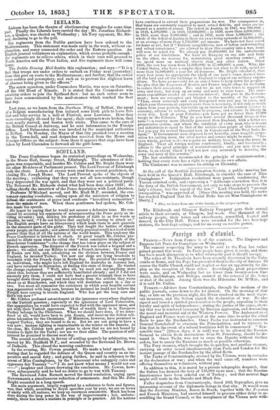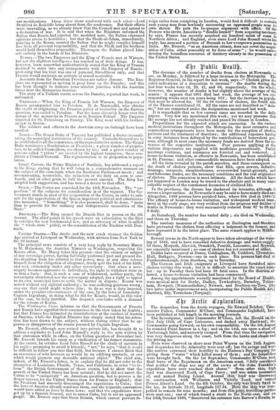fnrrigu nn
FRANCE.—News from France is of the scantiest. The Emperor and Empress left Paris for Compiegne on Wednesday. The rumour respecting the army to he sent to the East has rather gained ground this week. In Paris people have given it credit, and there has been much discussion as to what stratagetic post it should occupy.
The relics of St. Theodosia have been recently discovered in the Cata- combs at Rome, and the Pope has presented them to the city of Amiens. Of course the Gallic Church could not neglect so fine an opportunity for dis- play as the reception of these relics. Accordingly, great preparations were made, and on Wednesday last no fewer than twenty-seven Car- dinals, Archbishops, and Bishops, assisted at the removal of the bones or dust of the saint. Among them was the Hibernian Dr. M'Hale, and it is said Dr. Cullen.
TURKEL—Advices from Constantinople, through the medium of the public journals, come down to the 1st instant. On the morning of that day, or late on the previous night, the Divan resolved on the most vigor- ous measures, and the Sultan signed the declaration of war. Ile also signed and issued a spirited proclamation to the people, appealing to their loyalty and spirit of independence ; stating the justice of the cause, show- ing that war is rendered necessary by Russian aggression, and demanding the moral and material aid of the Western Powers. The Ambassadors of England and France were requested at the same time to order the allied fleets to pass the Dardanelles. Omer Pacha was instructed to summon General Gortchakoff to evacuate the Principalities, and to intimate to him that in the event of a refusal hostilities will be comnienced; " Rea- sonable time" [fifteen days, it is said] was to be allowed the Russian General to obtain fresh instructions from St. Petersburg, should he de- mand it. Omer Pacha was not to cross the Danube without further orders, but to annoy the Russians as much as possible otherwise.
The Fury steamer, which brought the despatches, met another steamer, carrying an order issued simultaneously from Paris and London for the instant passage of the Dardanelles by the allied fleets.
The Turks of Constantinople, aroused by the Memel; were in ecstacies at the declaration of war ; and when the mail came off, numbers were offering themselves as volunteers, without pay.
In addition to this, it is stated by a private telegraphic despatch, that the Sultan has decreed the levy of 150,000 more men ; that the Russian functionaries have been ordered out of Turkey ; and that neutral flags might still trade in the Danube and Black Sea.
Fuller despatches from Constantinople, dated 26th September, give an interesting account of the diplomatic doings in that city. It would seem that the Austrian Minister, Baron de Bruck, together with the Pi ussian and French Ministers, had exerted himself to procure either delay in as- sembling the Grand Council, or the acceptance of the Vienna note with-
out modifications. These three alone conferred with each other—Lord Stratford de Redcliffe being absent from the conference. But their efforts were unavailing, as we already know that the Council met and agreed to a declaration of war. It is said that when the Ministers informed the Sultan that Russia had rejected the modified note, the Sultan epressed opinions averse to hostilities ; but that the Shea-ul-Islam, immediately, pointing to the Koran, assured the Sultan that he might consider himself free from all personal responsibility, and that the Sheik and his brethren would hold themselves responsible. Thereupon the Sultan placed him- self entirely in the hands of his Ministers.
Russo.—The two Emperors and the King of Prussia met at Warsaw, but not the slightest intelligence has reached us of their doings. It has, however, been somewhat authoritatively stated that the King of Prussia declined to enter into any arrangements with the Emperor of Russia ; professing that his visit was one of personal; friendliness only, and that Prussia would maintain an attitude of armed neutrality. Accounts from the Danubian Provinces are rather obscure. The Rus- sians are represented as moving in great force up the Danube ; and this has been thought to indicate some ulterior junction with the Austrian forces near the Hungarian frontier.
The story of a Turkish ramie. across the Danube, reported last week, is unfounded.
RuGssiamaAeNeYon7panieednl,ihnes Wmaaerstaeiwifrell,iewPem
poelritoari to!.
the credit of originating the Prussian policy of neutrality on the Eastern question, was called to Potsdam. But the same obscurity hangs over the doings of the monarchs in Prussia as in Russian Poland. The Emperor departed for St. Petersburg on Sunday. The King went with his brother- in-law to Stettin.
The soldiers and officers in the Austrian army on furlough have been recalled.
ITALY.—The Grand Duke of Tuscany has published a decree reconsti- tuting the municipal institutions of the country. Councils-General are to be established in all the communes, on the representative system. The Grand Duke nominates a Gonfaloniere or President ; a given number of proprie- tors, to be called Councillors, are chosen by lot; and a given number of persons called " priors " are elected by the highest taxpayers; these con- stitute a Council-General. The representation is in proportion to popu- lation.
Count Cavour, the Prime Minister of Sardinia, has addressed a report to the King, stating that he will bring in a comprehensive measure on the subject of the corn-trade when the Sardinian Parliament meets ; and recommending, meanwhile, the reduction of the duty on corn to one- fourth, and on other grain to half the present amount. The King has adopted both suggestions, and has issued a decree to that effect.
SPAIN.—The Cortes are convoked for the 19th November. The " ex- position" of the subjects for consideration is of the vaguest. The Go- vernment stands in need of the cooperation of the Cortes, in order to sub- mit for the approbation of the Queen important political and administra- tive measures. " Something," it is also promised, shall be done, " more than to provide for the ordinary and indispensable necessities of the State."
DENMAIM.—The King opened the Danish Diet in person on the 4th instant. The chief points in his speech were an exhortation to the Diet to consider the new fundamental law, and an advocacy of what is called the " whole state" policy, or the consolidation of the Duchies with Den- mark.
UNITED STATES.—The Arctic and the new crack steamer the Golden Age arrived at Liverpool on Wednesday, with advices from New York to the 2d instant.
The principal news consists of a very long reply by Secretary Marcy to M. Hulseman, the Austrian Minister at Washington, respecting the Kossta affair. Mr. Marcy takes this ground—that the citizen or subject of any sovereign power, having faithfully performed past and present du- ties resulting from his relation to that power, may at any time release himself from the obligation of allegiance, freely quit the land of his birth, and seek citizenship under any other sovereignty : that when a sove- reignty becomes oppressive to individuals, the right to withdraw rests on as firm a basis : that, in such a ease of withdrawal, neither party, the sovereignty abandoned nor the sovereignty adopted, has a right to appeal to its own municipal laws to settle the matter in dispute : Kossta was seized without any rightful authority ; he was suffering grievous wrong ; any one that could might relieve him ; to do so was a duty imposed, under the peculiar circumstances of the case, by the laws of humanity : Captain Ingraham, in doing what he did for Kossta, would, in this view of the case, be fully justified. The despatch concludes with a demand for the release of Kossta.
The Washington Union informs us that the Governments of Prussia and Russia have signified their concurrence in the view taken by Austria ; but that France has intimated its dissatisfaction at the conduct of Austria at Smyrna, while the English Minister has simply stated that his atten- tion has been drawn to the subject, without stating either that he ap- proves or disapproves of the course pursued by Captain Ingraham.
Mr. Everett, although now retired into private life, has thought fit to address a rejoinder to Lord John Russell's reply to the note written by that statesman while in office, on the Cuban question of December last. Mr. Everett intends his essay as a vindication of his former statements. At the outset, he rebukes Lord John Russell for the shade of sarcasm in his reply—promising to avoid it himself; "not," he says, "that it would be difficult to follow you into that field, but because I cannot think that an encounter of wits between us would be an edifying spectacle, or one which would promote any desirable national object." The chief aim, indeed, of Mr. Everett's letter, is to explain that he did not refer to the absorption of Louisiana, Florida, Texas, and California, in order "to in- form" the British Government of those events, but to show that the growth of the United States has been natural ; that he did not assert the Cuban to be " exclusively " an American question, but to possess a far deeper interest for the United States than for France or England ; that the President had sincerely discouraged the expeditions to Cuba ; that the laws of America already condemn them, and the tripartite convention would have added no force to those laws; and that the expeditions were got up by a Spanish General, not to annex Cuba, but to aid an oppressed people. Mr. Everett says that Great Britain, which cannot prevent fo- reign exiles from conspiring in London, would find it difficult to restrain rash young men from lawlessly succouring an oppressed people near its own shores. He puts the tu-quoque argument with affect. • Of the Powers who invite Ameriea to "disable herself" from aciuiring territory, he says, France has recently acquired six hundred melee cif coast in Northern Africa ; and England, even since Lord John Russell wrote his reply, has annexed a portion of Burnish to her overgrown possessions in -India. Mr. Everett, "as an American citizen, does not covet the acqui- sition of Cuba, either peaceably or by force of arms" ; he would rather develop the boundless resources of territory already in the poasesaiou of the United States.



























 Previous page
Previous page